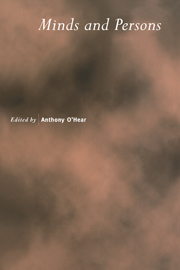Book contents
- Frontmatter
- Contents
- Preface
- Notes on Contributors
- Perceptual, Reflective and Affective Consciousness as Existence?
- The Domain of Folk Psychology
- Minds, Persons and the Unthinkable
- Moderately Massive Modularity
- A Theory of Phenomenal Concepts
- Free Will and the Burden of Proof
- Materialism and the First Person
- Language, Belief and Human Beings
- Human Minds
- Non-Personal Minds
- Personal Agency
- Mental Substances
- Mind and Illusion
- Index
Language, Belief and Human Beings
Published online by Cambridge University Press: 04 August 2010
- Frontmatter
- Contents
- Preface
- Notes on Contributors
- Perceptual, Reflective and Affective Consciousness as Existence?
- The Domain of Folk Psychology
- Minds, Persons and the Unthinkable
- Moderately Massive Modularity
- A Theory of Phenomenal Concepts
- Free Will and the Burden of Proof
- Materialism and the First Person
- Language, Belief and Human Beings
- Human Minds
- Non-Personal Minds
- Personal Agency
- Mental Substances
- Mind and Illusion
- Index
Summary
1. We may think of the core of Cartesian dualism as being the thesis that each of us is essentially a non-material mind or soul: ‘non-material’ in the sense that it has no weight, cannot be seen or touched, and could in principle continue to exist independently of the existence of any material thing. That idea was, of course, of enormous importance to Descartes himself, and we may feel that having rejected it, as most philosophers now have, we have rejected what is of greatest philosophical significance in Descartes' conception of the self. That would, I believe, be a mistake. Something akin to the Cartesian mind-body contrast still has a pervasive grip on philosophical thought across a whole range of issues. The contrast is, I believe, reflected in common philosophical versions of the contrasts between mind and body, fact and value, reason and emotion, word and deed, reason and persuasion, and no doubt others. My central concern in this paper is, however, a familiar philosophical understanding of the relation between, on the one hand, belief and its articulation in words and, on the other, action or feeling.
2. We are, in practice, ready to ascribe beliefs to others on the basis of their observed behaviour. Of course, these ascriptions are dependent, in varying degrees, on our knowledge of the individual's context; but given that context we sometimes, without hesitation, judge on the basis of his or her behaviour that, for example, he thinks the building is about to collapse, or she thinks her husband has arrived home.
- Type
- Chapter
- Information
- Minds and Persons , pp. 141 - 158Publisher: Cambridge University PressPrint publication year: 2003
- 1
- Cited by

